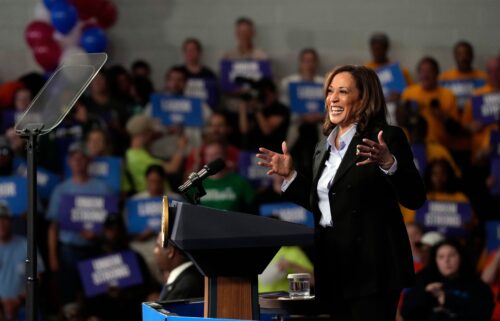Opinion: What’s happening at Columbia is a disgrace
(CNN) — On Sunday, I went to Columbia University just uptown from my office to see for myself what is happening there.
As I approached the gates of the university, I saw a seething protest. Drums and chants rang down Amsterdam Avenue. Crowds on both sides of the fence egged each other on, repeating calls for intifada and revolution.
And yet the most sobering experience came from a listening session hosted in the Hillel by the Columbia Task Force on Antisemitism. Approximately 80 Jewish students from across the university came to tell their stories about their encounters with anti-Israel protesters, crowding into a room. Some were crying. Some were yelling in anger. They shared individual stories, each more harrowing than the previous one.
Students told me of having liquids flung at them and getting screamed at for simply wearing a Jewish star.
Students illustrated the madness by showing me videos on their phones. One depicted the assault of a Jewish classmate, an Israeli flag ripped from his hand. Another showed a Jewish student being screamed at by a fully masked individual who came right up to his face, his voice shaking with fury.
I saw a photo of someone standing in front of openly Jewish students; she held up a sign that read, “Al-Qasam’s next targets,” a reference to an armed wing of Hamas. I saw images of oversized posters planted on the Columbia quad, each lionizing men Israel viewed as terrorists. Demonstrators calling openly for Hamas to burn Tel Aviv. Others yelling that October 7 is about to be every day.
To be fair, it is not clear that all of those harassing and assaulting Jewish students are Columbia students. It is quite clear that campus outsiders — even high-profile critics of Israel like Mohammed el-Kurd, Norman Finkelstein and Nerdeen Kiswani — are abundant on campus.
But maybe the most jarring moment came when I left the Hillel building. Standing on the corner, a young woman I had seen during the listening session approached me. She introduced herself and literally broke down in tears. She sobbed and sobbed, overcome by exhaustion, and expressed what I heard throughout the afternoon: anguish, desperation, fear.
What I saw in Morningside Heights felt like a postcard from the future, a glimpse of what lies ahead if we don’t get our arms around this problem without delay. That’s because I have seen firsthand how this situation is unfolding at numerous campuses across the country. And I’m not talking about protests — I‘m talking about sheer, unfettered rage.
And we shouldn’t kid ourselves. While not all of the protestors are violent, the repeated calls of “free Palestine” or “ceasefire now” are not about the legitimate claims of one group of people. They are about marginalizing a group of people, forcibly silencing and shoving them out of public spaces — not because of what they might believe, but simply because of who they are.
Columbia is a preview of a future where persecution has been normalized. This is not some parochial concern. Virulent antisemitism clearly is a problem on its own, but it also is a harbinger of other forms of hate. In that vein, this virus will spread and other minorities will be targeted.
For all of these reasons, it is time for immediate and swift action at Columbia and across the country.
First, Columbia President Minouche Shafik may be doing her best, but she should invite the NYPD back onto her campus to provide the protection that campus security has failed to deliver. And college presidents across the country need to engage with local law enforcement now to develop plans to ensure the safety of their Jewish students. No one should wait for a tragedy to happen in order to take action.
Second, no university should permit full-face masking on their campus. This would not jeopardize the health of any persons — you could wear a medical mask to prevent the spread of viruses like Covid. But entire face coverings intended to disguise an individual should not be allowed on any university environment. This is not a free speech issue. It’s a public safety imperative.
Third, we should reinstitute deterrence: a one-strike policy for those who violate the rules or who break the law. If one student violates the code of conduct, we need the imposition of drastic sanctions, including suspension. If a non-student enters campus and engages in violative behavior, they should be arrested for trespassing, let alone other offenses as appropriate. If local police are on site, this will be easy to implement.
Finally, donors, alumni and parents need to demand action — and to take action themselves. Every single donor who cares about this issue, who treasures their campus, needs to engage. Stopping funds will get attention. Diverting funds to support nonprofit organizations like the Community Security Service that train volunteers to protect Jewish students, or to universities specifically to support the security of Jewish students on campus, could be even more effective.
I anticipate that some critics, even some students, will protest. First, they will gaslight the Jewish victims and complain that it’s the agitators who are suffering from political persecution. Nothing could be farther from the truth. Just because someone says the earth is flat does not make it so.
Others will contest that these guidelines would turn a campus into a police state. However, campuses cannot be lawless zones where anarchy reigns. Jewish students need to be protected.
Already, agitators are threatening to replicate Columbia-style protests at other institutions, and indeed it is already happening at places such as Yale University and Massachusetts Institute of Technology. Before this happens, schools need to reassert some measure of authority and retake their campuses from these anti-Israel protests.
The-CNN-Wire
™ & © 2024 Cable News Network, Inc., a Warner Bros. Discovery Company. All rights reserved.

